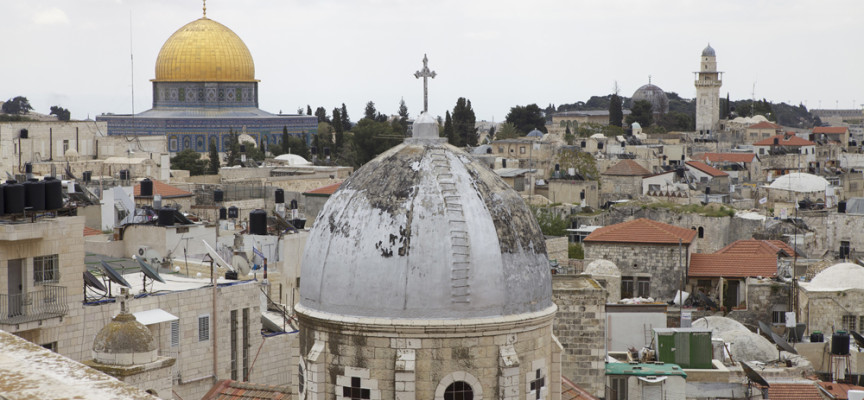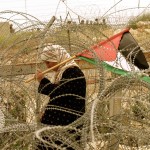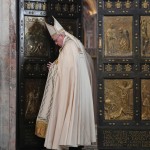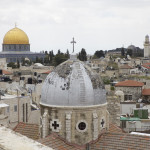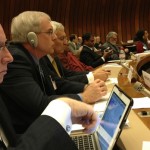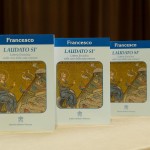Statement of the Coordination of Bishops’ Conferences in support of the Church in the Holy Land, 14 January 2016
“We must regain the conviction that we need one another, that we have a shared responsibility for others and the world, and that being good and decent are worth it” (Laudato Si’ 229). As the Bishops of the Holy Land Coordination, we echo Pope Francis’ plea in his recent Encyclical Letter, Laudato Si’ (Praise Be to You), to remember our interdependence in an integrated world. Here in this land holy to Jews, Christians and Muslims, we have been reminded during our visit of the Church’s enduring presence among the weak and vulnerable and those who are too often forgotten. We take away our experiences and the stories that we have heard, and we are determined to give a voice to the voiceless. The ongoing violence makes it all the more urgent that we remember and assist all, especially those on the margins, who seek to live in justice and peace. To the Christian community and young people of Gaza, you are not forgotten. The 2014 war led to the destruction of thousands of homes and the physical and social infrastructure of Gaza, as well as the deaths of both Israelis and Palestinians. One and a half years later, while there are signs of hope and the resilience of the population is remarkable, many remain homeless and traumatised by the war. The blockade continues to make their lives desperate and they effectively live in a prison. At Holy Family Parish we were told: “In this Year of Mercy, one of the acts of mercy is to visit prisoners and I thank you for visiting the largest prison in the world.” The ability of so many Christians and Muslims to support each other in this situation is a visible sign of hope and, at a time when many seek to divide communities, an example to us all. To the Christian community of Beit Jala, where the Israeli confiscation of land and the expansion of the separation wall in the Cremisan Valley, in violation of international law, further undermine their presence in the Holy Land, you are not forgotten. Throughout 2016 we shall raise your plight nationally and internationally. To those Israelis and Palestinians who seek peace, you are not forgotten. The right of Israel to live in security is clear, but the continuing occupation eats away at the soul of both occupier and occupied. Political leaders across the world must put greater energy into a diplomatic solution to end nearly 50 years of occupation and resolve the ongoing conflict so the two peoples and three faiths can live together in justice and peace. To the Christian refugees we met in Jordan, you are not forgotten. We heard about the trauma and difficulties in trying to rebuild their lives. For most, returning home is no longer an option. Jordan is struggling to cope with almost a quarter of its population now made up of refugees. The efforts of the local Church and NGOs in reaching out to all refugees – both Christian and Muslim – are significant and commendable in terms of addressing the refugees’ loss of human dignity, but the international community must do more to alleviate their plight and work for peace across the region.
To the priests, religious communities and lay people of the Church in Jordan, you are not forgotten. The Church in Jordan is vital and growing, but Christians are fearful of the growing extremism in the region. It is to be hoped that the coming into force on 1 January of the Comprehensive Agreement between the Holy See and the State of Palestine, offers us a model of dialogue and cooperation between States that respects and preserves freedom of religion and freedom of conscience for all people. With a promise of active solidarity, we make our own the prayer of Pope Francis in Laudato Si: “O God of the poor, help us to rescue the abandoned and forgotten of this earth, so precious in your eyes”.
Bishop Declan Lang, (Clifton, England and Wales)
Archbishop Stephen Brislin (Cape Town, South Africa)
Bishop Pierre Bürcher (Iceland)
Bishop Oscar Cantú (Las Cruces, USA)
Archbishop Rodolfo Cetoloni (Italy)
Bishop Christopher Chessun (Church of England)
Bishop Michel Dubost (Évry-Corbeil-Essonnes, France)
Bishop Lionel Gendron (Saint-Jean–Longueuil, Canada)
Bishop Felix Gmür (Basel, Switzerland)
Bishop William Kenney (Birmingham, England and Wales) – COMECE
Bishop John McAreavey (Dromore, Ireland)
Bishop William Nolan (Galloway, Scotland)
Bishop Thomas Maria Renz (Rottenburg-Stuttgart, Germany)
Archbishop Joan Enric Vives (Urgell, Spain)
(source: www.ccee.eu)
Dichiarazione del Coordinamento delle Conferenze episcopali a sostegno della Chiesa in Terra Santa, 14 gennaio 2016
“Occorre sentire nuovamente che abbiamo bisogno gli uni degli altri, che abbiamo una responsabilità verso gli altri e verso il mondo, che vale la pena di essere buoni e onesti” (Laudato si’ 229). Come vescovi del Coordinamento Terra Santa, facciamo eco all’appello di Papa Francesco nella sua recente Lettera Enciclica Laudato si’, mi’ Signore, nel ricordare la nostra interdipendenza in un mondo sempre più unificato. Qui, in questa Terra Santa per gli ebrei, i cristiani e i musulmani, ci è stato ricordato durante la nostra visita, la presenza duratura della Chiesa tra i deboli, i vulnerabili e quanti sono troppo spesso dimenticati. Portiamo via le nostre esperienze e le storie che abbiamo ascoltato, e siamo determinati a dare voce ai senza voce. La violenza in corso rende ancor più urgente che ci si ricordi e si assistano tutti, specialmente quelli ai margini, che cercano di vivere nella giustizia e di pace. Alla comunità cristiana e ai giovani di Gaza, voi non siete dimenticati. La guerra del 2014 ha portato alla distruzione di migliaia di case e delle infrastrutture materiali e sociali di Gaza, così come alla morte di israeliani e palestinesi. Un anno e mezzo dopo, mentre ci sono segni di speranza e la capacità di ripresa della popolazione è notevole, molti rimangono senza casa e traumatizzati dalla guerra. Il blocco continua a rendere la loro vita disperata e vivono effettivamente in una prigione. Nella parrocchia della Sacra Famiglia ci è stato detto: “In questo Anno della Misericordia, uno degli atti di misericordia è quello di visitare i prigionieri e vi ringrazio per aver visitato la più grande prigione del mondo”. La capacità di tanti cristiani e musulmani nel sostenersi a vicenda in questa situazione è un segno visibile di speranza e, in un momento in cui molti cercano di dividere le comunità, un esempio per tutti noi. Alla comunità cristiana di Beit Jala, dove la confisca della terra e l’espansione del muro di separazione nella valle di Cremisan da parte di Israele, in violazione del diritto internazionale, minano ulteriormente la sua presenza in Terra Santa, voi non siete dimenticati. Per tutto il 2016 presenteremo la vostra grave situazione a livello nazionale e internazionale. A quei palestinesi e israeliani che cercano la pace, voi non siete dimenticati. Il diritto di Israele di vivere in sicurezza è chiaro, ma l’occupazione continua corrode l’anima di entrambi, occupanti e occupati. I leader politici di tutto il mondo devono mettere maggiore energia nella ricerca di una soluzione diplomatica per porre fine a quasi 50 anni di occupazione e per risolvere il conflitto in corso in modo che i due popoli e le tre fedi possano vivere insieme in giustizia e pace. Ai rifugiati cristiani che abbiamo incontrato in Giordania, voi non siete dimenticati. Abbiamo sentito del trauma e delle difficoltà nel cercare di ricostruire le loro vite. Per la maggior parte, il ritorno a casa non è più un’opzione. La Giordania sta lottando per far fronte a quasi un quarto della sua popolazione ora composta da rifugiati. Gli sforzi della Chiesa locale e delle ONG nell’aiutare tutti i rifugiati – cristiani e musulmani – sono significativi e lodevoli specie nell’affrontare la perdita di dignità umana da parte dei rifugiati, ma la comunità internazionale deve fare di più per alleviare le loro sofferenze e lavorare per la pace in tutta la regione. Ai sacerdoti, alle comunità religiose e ai laici della Chiesa in Giordania, voi non siete dimenticati. La Chiesa in Giordania è vivace e in crescita, ma i cristiani sono timorosi dell’estremismo crescente nella regione. Si spera che l’entrata in vigore il 1° gennaio dell’Accordo globale tra la Santa Sede e lo Stato di Palestina, ci offra un modello di dialogo e di cooperazione tra gli Stati che rispetti e preservi la libertà di religione e la libertà di coscienza per tutti i popoli. Con una promessa di solidarietà attiva, facciamo nostra la preghiera di Papa Francesco nella Laudato Si’: “O Dio dei poveri, aiutaci a riscattare gli abbandonati e i dimenticati di questa terra che tanto valgono ai tuoi occhi”.
S.E. Mons. Declan Lang (Clifton, Regno Unito – Coordinatore)
S.E. Mons. Lionel Gendron (Saint-Jean, Canada)
S.E. Mons. Michel Dubost (Évry-Corbeil-Essonnes, Francia)
S.E. Mons. Thomas Maria Renz (Rottenburg-Stuttgart, Germania)
S.E. Mons. John McAreavey (Dromore, Irlanda)
S.E. Mons. Rodolfo Cetoloni (Grosseto, Italia)
S.E. Mons. Pierre Bürcher (Islanda)
S.E. Mons. William Nolan (Galloway, Scozia)
S.E. Mons. Stephen Brislin (Città del Capo, Sud Africa)
S.E. Mons. Joan Vives (Urgell, Spagna)
S.E. Mons. Dr. Felix Gmür (Basilea, Svizzera)
S.E. Mons. Oscar Cantú (Las Cruces, USA)
S.E. Mons. William Kenney (Birmingham, Regno Unito) – COMECE
S.E. Mons. Christopher Chessun (Chiesa d’Inghilterra)
(fonte: www.ccee.eu)
Latest posts by EURCOM (see all)
- What are the aims of the European security and defence policy? - 12 aprile 2017
- The Church is for the European project - 28 marzo 2017
- A message for Europe - 28 marzo 2017

